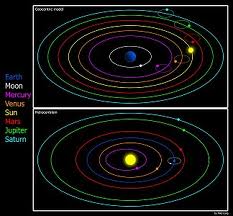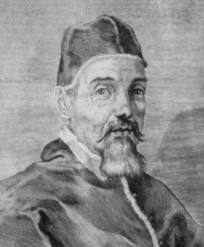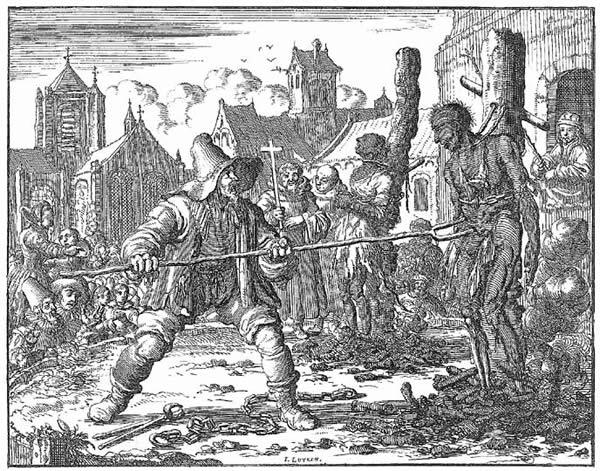The life of Galileo Galilei is one of the most beautiful and tragic examples of a man caught between two worlds. His life has become an anecdote for the person who finds themselves wrestling with questions about reality, truth, and the whirlwind of internal and external consequences that arise when our belief systems are challenged. I don’t think the correct conclusion is to assume that one option(being scientific fact) displaces the other option (faith and ideology) or vise versa, but the lesson learned here lies much deeper. For me, I find the whole controversy between Galileo’s study of the cosmos and the orthodox teachings of the Catholic Church fascinating, and telling, and relevant to our daily lives.
Galileo was born in 1564, during a time in which tensions already existed. The teachings of the Catholic Church were being questioned by those who were unsettled with its dogma, such as Martin Luther; whose Doctrine of Two Kingdoms marked the beginning of the separation of Church and State. It was not only the threat of losing political power that the church feared, but reform and loss of prestige as a spiritual governing authority. The protestant reform was already threatening the idea of “Divine Right” that God appointed Kings and Rulers based on lineage; and that power could only be passed only to those elect individuals. The order of “Divine Right”also meant that a King or ruler was still subject to the influence and approval of the Church. Upward or downward mobility was practically non-existent amongst social classes in general, as they were also seen as pre-destined by God.
When it came to social change, scientific and mathematical observations, it seemed that any new ideas could be a possible heretical attempt to compromise the authority of the church’s teaching. Galileo; an Italian physicist, astronomer and mathematician, was a supporter of Copernicus’ heliocentric theory that the Sun was the center of the Universe, not the earth; which was the accepted belief based on Aristotle’s theory of geocentrism.  The Church backed this belief as it seemed to prove scriptural. Certain scriptures like Psalm 93:1, 96:10 and 1 Chronicles talk about the earth being firmly positioned, and cannot be moved; which would seem to fit the idea of the earth being established as the unmovable center of the Universe. Ecclesiastes 1:5 says “the sun rises and sets and returns to its place” which seems to fit with the idea that the sun revolves around the earth. The church instructed that the Earth’s location as the center of the Universe had to do with humanity’s centrality to the plan of God. These two ideas were inseparable. The idea of the earth being one of five other planets (known at the time) revolving on their axis around the Sun, really screwed with people’s theology.
The Church backed this belief as it seemed to prove scriptural. Certain scriptures like Psalm 93:1, 96:10 and 1 Chronicles talk about the earth being firmly positioned, and cannot be moved; which would seem to fit the idea of the earth being established as the unmovable center of the Universe. Ecclesiastes 1:5 says “the sun rises and sets and returns to its place” which seems to fit with the idea that the sun revolves around the earth. The church instructed that the Earth’s location as the center of the Universe had to do with humanity’s centrality to the plan of God. These two ideas were inseparable. The idea of the earth being one of five other planets (known at the time) revolving on their axis around the Sun, really screwed with people’s theology.
Galileo’s telescope allowed him to view the cosmos and confirm that in fact, Copernicus theory of the Universe was indeed, correct. The earth revolved around the sun. What is interesting is that Galileo did not personally see this as a contradiction to his faith; as he was a Catholic, but rather that the scriptures being used to ground geocentrism were mis-interpreted. God in his infinite wisdom, was not confined to creating within our understanding, but His. Minds like Johannes Kepler; a contemporary of Galileo, felt the same way. To them, discovery of the natural world was a key to understanding its creator. Besides that, the psalmist of the Old Testament were limited in their ability to understand the Universe and would have had to describe creation as they were able to conceive it from a terrestrial point of view. The real problem lies in the fact that the Church had based their theological understanding on a theory ( Aristotle’s and Ptolemy’s) and any scientific advances that proved that theory false, meant that the Church was wrong; which just wasn’t happening.
Things took a turn for worse when a respectful admirer and friend of Galileo, Pope Urban VIII began to fear for his life, as the pressure to expose and eradicate heresy swept through Europe. Galileo’s enemies accused Urban of being soft on defending the church, so he reacted out of fear and anger. In Galileo’s book “Dialogue concerning the Two World Systems” he presents fictional characters presenting the conflicting ideas of Heliocentrism and Geocentrism. The character advocating Geocentrism was named humorously enough, Simplicius. Galileo made the mistake of placing verbatim and recognizable words from the Pope’s mouth into Simplicius’. He was therefore, tried by the Inquisition and found guilty on three accounts of heresy. Galileo was forced to renounce all of his precious work and placed under house arrest for the rest of his life; a lighter sentence given the track record of the Inquisition. Many others were burned at the stake or tortured into renouncing their work.
Galileo’s enemies accused Urban of being soft on defending the church, so he reacted out of fear and anger. In Galileo’s book “Dialogue concerning the Two World Systems” he presents fictional characters presenting the conflicting ideas of Heliocentrism and Geocentrism. The character advocating Geocentrism was named humorously enough, Simplicius. Galileo made the mistake of placing verbatim and recognizable words from the Pope’s mouth into Simplicius’. He was therefore, tried by the Inquisition and found guilty on three accounts of heresy. Galileo was forced to renounce all of his precious work and placed under house arrest for the rest of his life; a lighter sentence given the track record of the Inquisition. Many others were burned at the stake or tortured into renouncing their work.
The funny thing is, all of us today learn about the Universe according to Galileo’s research and Copernicus’ heliocentric theory, which is no longer a theory but an accepted truth about the natural world, taught in both private and public schools. Christians today do not feel compromised about their faith due to the fact that the earth is not the center of the Universe, either. A lot has changed, and today the Church ( both the Catholic church and the Protestant secs; I see them as one in intention) have gone through layers of reformation to undo the deep-seated corruption that began almost as soon as Jesus ascended back into heaven; although it seems to be a slow process I must admit.
I have to wonder about the emotional turmoil of one man, wired brilliantly to pursue God through His creation, created to learn and discover, designed to experience the uncreated through the created and yet oppressed and rejected by the ones who should have embraced him, accepted him, at least tried to understand him and what he was saying; even if he ended up being wrong. When I consider the manner in which Jesus himself lived, taking no offense to even those who spit on him, whipped him, and hung him on a cross, I have to wonder why we get so offended at a mere challenge? What is more, it is apparent that Galileo was not trying to disprove God, but to better understand how the Universe works. This whole thing does not come down to Galileo vs. the Bible or verses God, it was Galileo versus the Church, the minds of men, which are fallible.
Why is this applicable to us today? I know that as a Christian I am constantly learning about what it means to love and serve God with my life, and there have been times that I have been wrong about what I thought a scripture meant or what I thought God’s will was. I truly believe that the Bible is reliable in its presentation of God’s nature, his relationship to humanity, and what he desires for humanity, but that doesn’t mean I think I know everything there is to know about God or that I have a perfect understanding of his will. None of us do. The whole idea of a relationship with Him is that as we seek Him and search Him out, we begin to see more and more who He is. The scriptures speak of this mystery
Proverbs 25: 2 It is the glory of God to conceal a matter;
to search out a matter is the glory of kings.
Or in a modern translation of the same exact verse
Proverbs 25:2 God delights in concealing things;
scientists delight in discovering things.
So, in God’s mind scientists are comparable to kings. To discover who He is and what He’s all about is just as much a natural phenomenon as it is a spiritual one. We were created for it, humans love to know the right answer. I spent most of my life believing that Pluto was a planet, and now I am told it’s not. Most of the time we fall short of the whole picture as much as we love to know things for certain. The truth is we will all be wrong at times, and it’s okay, as long as we are willing to learn from it. The Bible has been used by so many men to prove their own ideas, but the most important ideas expressed in the Bible are summed up in these two verses according to Jesus
Mark 12:30-31
The Message (MSG)
29-31Jesus said, “The first in importance is, ‘Listen, Israel: The Lord your God is one; so love the Lord God with all your passion and prayer and intelligence and energy.’ And here is the second: ‘Love others as well as you love yourself.’ There is no other commandment that ranks with these.”
Let’s ask ourselves everyday, are we really doing this?
you are brilliant
In the words of Jacks, “SUPERB.” This was a wonderful morning coffee read. Thank you for your encouragement & enlightenment, such a blessing! xxx